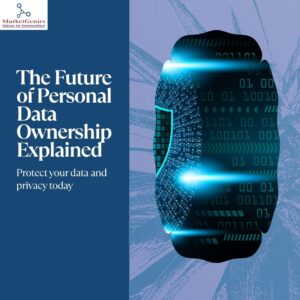Decentralised Identity: The Future of Personal Data Ownership
Introduction
As the internet expands safeguarding personal data has turned into a major concern. Decentralized Identity, or DID, has sparked a new approach to how people manage their online identities. It gives individuals actual control over their digital presence. Let’s take a close look at Marksteins’' breakdown of this evolving industry.
According to MarketGenics reports, in 2024, the market of decentralized identity has reached USD 850 million in the global market. It will grow at a CAGR of approximately 88.7 per cent between 2024 and 2030. This is projected to rise due to increasing worries about the evolving regulations of cyberattack and increasing levels of interest in privacy-oriented solutions to online environments.

Roadblocks
While the advantages are obvious, creating and putting decentralized identity systems into place comes with its own set of problems:
Shared Challenges and MarketGenics' Answers
● Differences in Standards:
○ The Problem: No single universal DID protocol exists, so making platforms work together becomes tricky.
○ How MarketGenics Helps: They map out ecosystems and craft joint roadmaps to bring industry standards in line.
● Trouble with Data Compatibility:
○ The Problem: It’s hard to connect DID setups with old databases used in banking, healthcare, and enterprise apps.
○ How MarketGenics Helps: They lay out interoperability guides to uncover tech issues and suggest how to link things up.
● Blockchain Scaling Problems:
○ The Problem: Rolling out blockchain on a big scale is expensive and complicated.
○ MarketGenics Solution: Provides tools to model performance and analyze market trends connected to scalable ledger systems.
● Regulatory Complexity:
○ Challenge: Following privacy laws across different regions is difficult.
○ MarketGenics Solution: Offers tools to monitor policies and map regulations across global markets.
● User Adoption Barriers:
○ Challenge: Many consumers lack knowledge or technical skills to use decentralised ID wallets.
○ MarketGenics Solution: Focuses on researching user behavior to build easy-to-use interfaces and organize educational initiatives.
Why Decentralised Identity Matters
● Data Ownership Is Key: DID allows people to control their digital credentials without depending on centralised servers vulnerable to hacks.
● Stronger Security, More Peace: With a central database gone, there is a likelihood of fewer massive data breaches to worry about and leave users with peace of mind.
● Well Integrates with the World Privacy Expectations: Decentralized identity would support regulations such as GDPR and India’s DPDP Act by helping to simplify compliance.
● Adapts to Many Industries: DID can simplify logins and verification processes in banking, healthcare, and social platforms.
Snapshot of the Global Market
● North America Takes the Lead: In 2024, it controls approximately 41.2 percent of the market through the vigorous investments of the tech giants and the governmental supportive policies.
● Asia-Pacific Gaining Momentum: Countries such as India, Singapore, and South Korea are putting resources into decentralized identity technologies.
● MarketGenics predicts the decentralised identity market could go beyond USD 12 billion by 2030 if the current growth continues.
What Lies Ahead
● Connecting to Web3 platforms: Decentralised identity (DID) might serve as the main solution to log in and verify transactions across dApps in the future.
● Rulemaking through DAOs: Decentralised Autonomous Organisations could take charge of identity verification creating self-managed digital environments.
● AI meets DID: The mix of artificial intelligence and decentralised identity could improve security and deliver more tailored digital experiences.
● Banking and Fintech: DID could play a key role in services like digital banking, Know Your Customer procedures, and peer-to-peer finance solutions by 2030.
Conclusion
Decentralized identity isn’t just a passing trend. It changes how individuals manage their personal information. As concerns about privacy grow, DID could very well become the standard approach.
MarketGenics delivers detailed insights and tech mapping to guide identity companies in shaping their strategies around new decentralized systems. This support helps businesses stay ahead while ensuring secure and effective leadership in a shifting environment.
